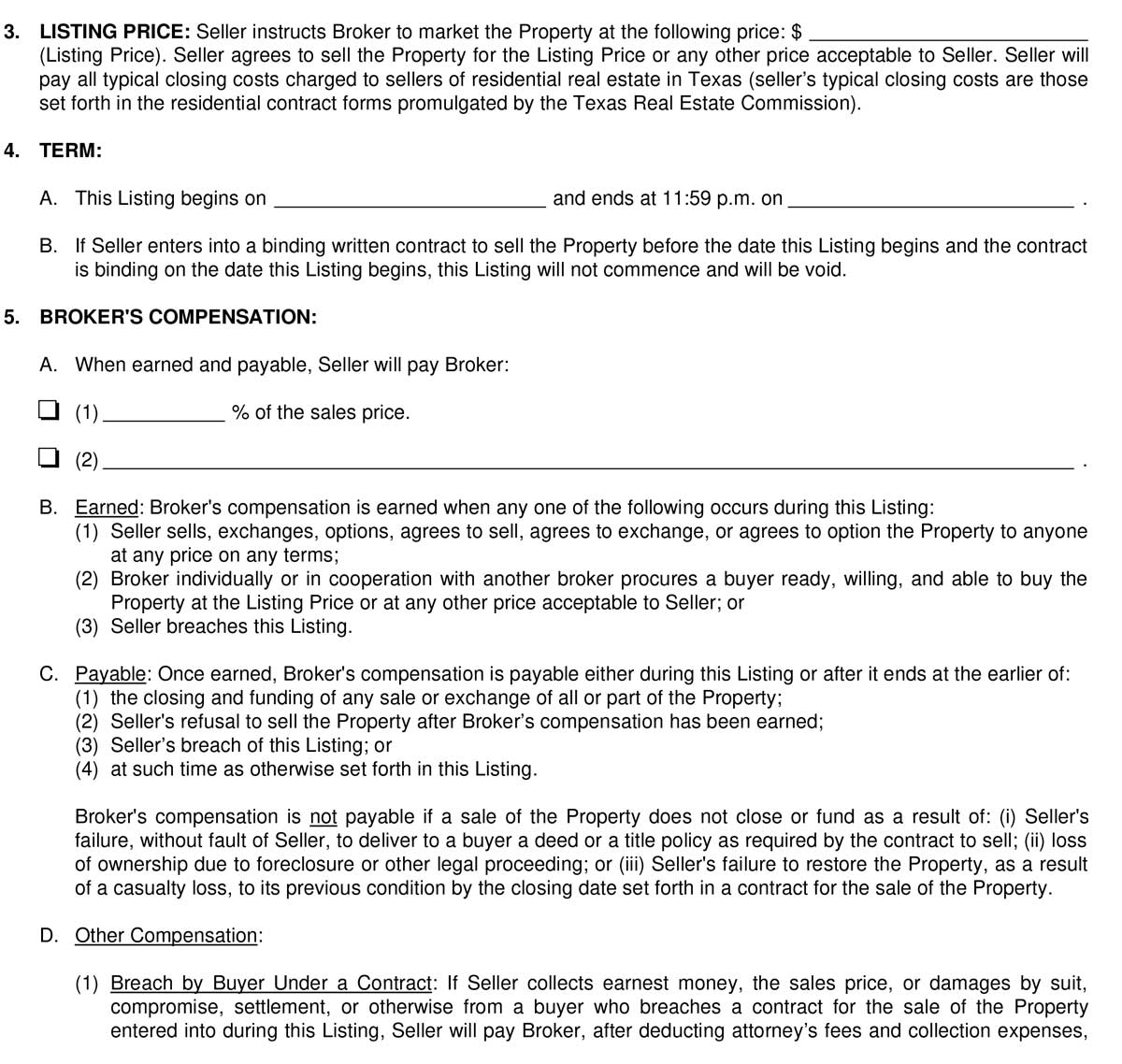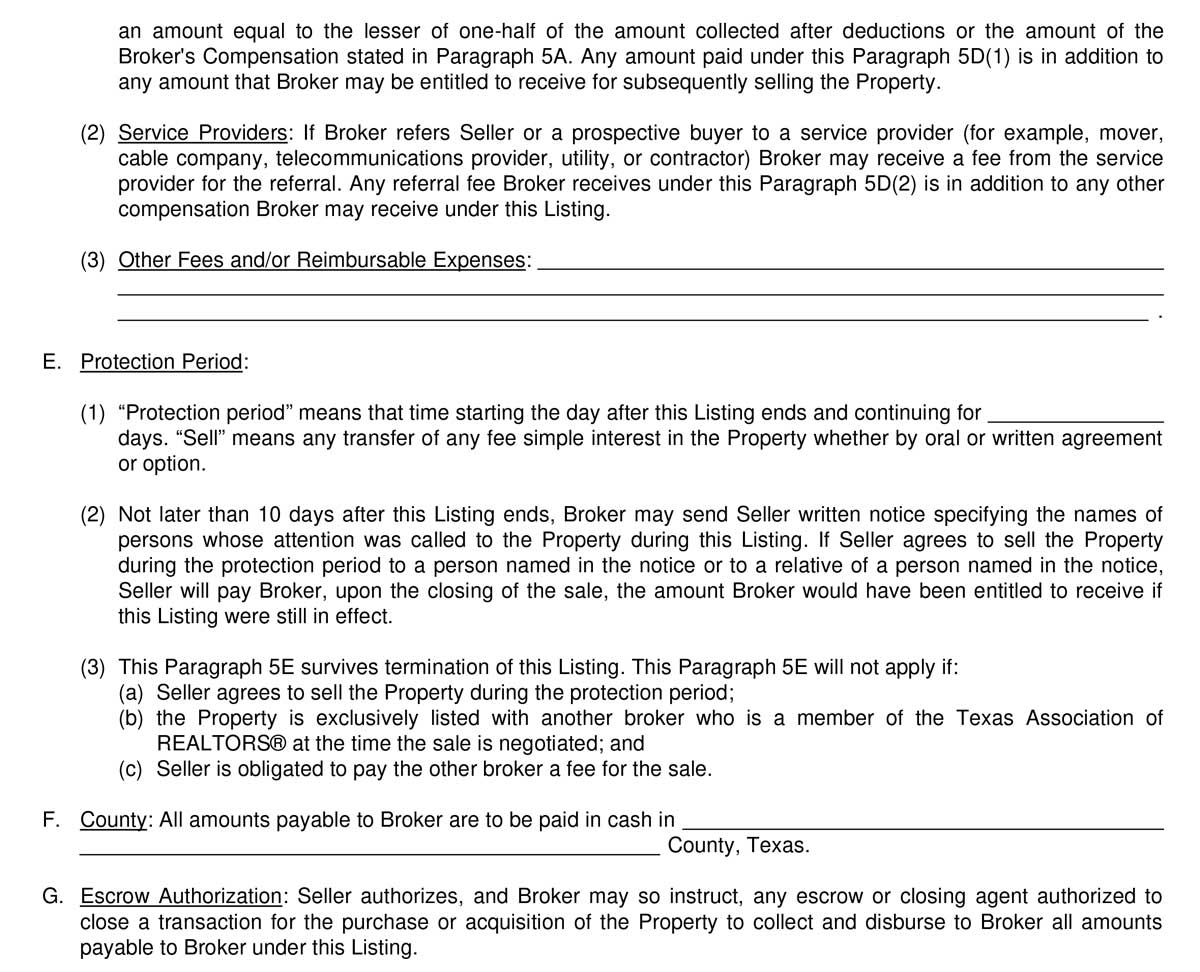 Note: The Texas Association of Realtors and TREC update promulgated forms regularly. For the most recent updates, check with TAR, TREC, or contact me at brian@starpointerealty.com.
Note: The Texas Association of Realtors and TREC update promulgated forms regularly. For the most recent updates, check with TAR, TREC, or contact me at brian@starpointerealty.com.
Note: I am a real estate professional, not a lawyer. Nothing herein should be construed as legal advice or instructions.
Takeaways
- Unless you have written exceptions, your listing agent earns their commission if your home sells at any point during the Term
- All the fees and commissions that your agent charges must be listed in Paragraph 5 – no surprises!
- The buyer’s agent usually gets half of the commission
Previously we discussed the first two paragraphs of the Listing Agreement, Parties and Property. Now we continue to the next three paragraphs, which are probably the three most important to a seller: Price, Term and Realtor Commissions.
Paragraph 3 – Listing Price. Mostly self explanatory. This is the price you are advertising the home for. It does not mean it is what a buyer will offer, or what the final price will be, but this is your starting point. Read my guide for more information on how I recommend choosing a good listing price (generally as close to the fair market value of your home as possible).
You are also acknowledging that you will be responsible for some typical closing costs. Your agent’s “Seller’s Estimate Net” sheet should show you approximately what those costs will look like. Paragraph 12 of the Purchase Contract is where the seller will eventually agree to those closing costs with the buyer.
If and when it comes time to adjust the price, you and your listing agent can do an amendment to this listing agreement.
Paragraph 4 – Term. This is the period during which your agent represents you. Remember that this agreement is the “Exclusive Right to Sell” agreement. If you sell your home to anyone during this term, your agent is entitled to the agreed commission.
There is an exception to this if you agree beforehand on specific people who are excepted from this agreement. For example, maybe you know your uncle wants to buy your house but is still getting his lender preapproval straight. Maybe you want to list the home on the market but not have to pay the commission in case your uncle comes through. You’d write his name on the Named Exclusion Addendum and attach it to this listing agreement.
When your listing term is nearing an end, you and your listing agent can extend the term in an amendment if you would like.
Paragraph 5 – Brokers Compensation. Remember how great it was when you were a buyer and the seller paid for everyone’s commissions (and probably closing costs, title policy, and more?). Well, unfortunately now the shoe is on the other foot. Selling a home is definitely not cheap, but fewer and fewer people are finding that they can do it without a Realtor, for a variety of reasons. Typical compensation is between 5%-7% of the sales price, however every agent is different. Agents can also charge a flat fee, instead of a percentage. I personally charge 6% on homes over $100,000, or a flat $6000 for homes under $100,000, for example.
Remember, half of this amount is promised to the buyer agent’s brokerage in Paragraph 8, so in my case, both brokerages get 3% and 3%. What if the buyer doesn’t have an agent for some reason? Well, firstly, make sure you understand the situation and whether your agent is now acting as an intermediary. Secondly, you are still technically on the hook for the 6%, but all of it will go to your listing agent’s brokerage.
Paragraph 5.B – Earned. When has your listing agent “earned” your commission? Not just at closing. If the seller agrees to a purchase contract of any sort, the listing agent has earned their commission (as long as the buyer actually is able to go through with it, which is why agent’s don’t get paid until closing). If the seller sells it on the side to someone else, the agent is owed a commission. And if the seller breaches the agreement, the agent is owed a commission.
I’ve seen the latter happen several times, where the seller accepts a buyer contract but then changes their mind about selling the house altogether. Sellers aren’t allowed to change their minds about selling once they’ve signed a purchase contract. Technically the seller could be forced to pay the commission, though in most cases I think the Realtor doesn’t bother and just want to move on.
Note that a seller can change their mind about selling after entering a listing agreement. Sellers don’t have to agree to a buyer’s offer just because it’s listed. A Realtor does NOT earn a commission simply for listing homes. They have to get a buyer who is able and willing to buy it at a price and terms the seller is willing to accept. Generally, a Realtor doesn’t earn a dime unless the home sells.
Paragraph 5.C – Payable. The listing agent usually “earns” their commission before they get paid for it. Usually they and the buyer’s agent are paid at the closing table when everyone else gets paid. But again, defaulting on a listing agreement or refusal to sell after agreeing with a buyer is grounds for the commission to be paid ASAP.
Paragraph 5.D – Other Compensation. This paragraph begins by saying the listing agent is entitled to some portion of the proceeds in the unlikely event that the seller gets money from a buyer who doesn’t buy the home (i.e. defaults on the buyer contract). Doesn’t happen often, that’s for sure.
Secondly, agents might receive referrals from vendors, and that has no bearing on the commission. (Look here for a list of local Fort Hood area vendors I recommend – I receive referral fees from none of them).
Listing a home is not cheap. Lockboxes are $125. Signs are $80. Professional photography is $100s, as might be advertising. Some agents like myself pay for this out of the commission, but some might charge separately for certain items. Most common are items like professional photography or just a flat transaction fee.
I do not charge extra for expenses related to my listing the home. But I might include something here if I am doing something extra for the seller, or even paying out of pocket to help keep their home in shape. For example, for a cash strapped seller, I might personally pay for a professional cleaning, pool service, lawn care, but request here to be reimbursed for these items at closing.
Paragraph 5.E – Protection Period. What if, on the last day of the listing agreement, a buyer falls in love with your home and writes an offer. What’s to keep a seller from waiting a day, not renewing the listing agreement, and proceeding with the buyer without having to pay any commissions? The protection period, of course.
After a listing ends and the seller declines to renew, the listing agent can send a list of people who looked at the property while listed on the market. These are buyers the listing agent “found” and is therefore entitled to a commission if the buyers buy during the protection period. Many agents misunderstand the protection period and will probably not send a list of buyers after the listing ends. I generally don’t. If the seller wants to move on, it’s better to let them go and get a fresh start with another agent.
30 days is common for a protection period.
The protection period is completely voided if the seller enters into a new listing agreement with another brokerage – you don’t have to wait for the protection period to end.
Paragraph 5.F – County. This is almost meaningless except it specifies which jurisdictions any legal issues will be filed pertaining to the agreement.
Paragraph 5.G – Escrow Authorization. The title company in Texas will be the one collecting the buyer’s money (or, usually, their lender’s money) and paying the seller. This paragraph authorizes the title company to pay the listing agent directly from those funds – no need to write your agent a personal check after the closing.
This was a lot, and perhaps the most important couple of paragraphs to do with the listing agreement! Next time will be Paragraphs 6 and 7 – Listing Service and Accessibility, all about what your agent is going to do for you once it’s listed.
If you are thinking about selling in the Fort Hood, TX area, I recommend downloading my Ultimate Fort Hood Seller Guide, full of information on what sellers should expect in our area. If you’re ready to get started or wondering what a fair list price for you home is, contact me for a home valuation!
Questions or comments about this article, please post them in the Facebook comments below so everyone can see them!


